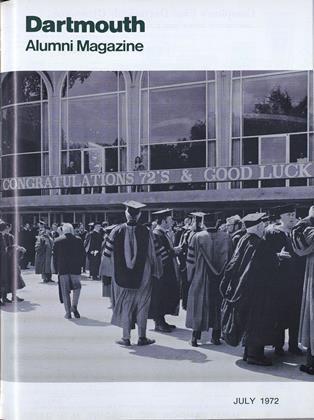MEMBERS OF THE CLASS OF 1972:
You were admitted to Dartmouth College in the month in which Martin Luther King was assassinated. Before you arrived on campus Robert Kennedy also was assassinated. During your freshman year you were on campus for the great rebate on ROTC, leading to the occupation of Parkhurst Hall and to several members of your class serving a jail sentence. During your sophomore year you witnessed and took part in a great national debate in the period of Cambodia and Kent State. You saw the explosion of colleges campuses all across the nation. Your junior year was a period of debate on the future of Dartmouth College. And your senior year was the year of decision, and then at the end of the year a renewal of the national debate.
It is an understatement to say that your four years at Dartmouth have been eventful. And yet, as these four years draw to a close, I see a number of very hopeful signs. I think we will see a definite easing of tensions among nations. I see hope for the termination of this highly divisive war. In recent months we have witnessed a rejuvenation of the democratic process in the United States. We have seen that the grass-roots movement can still be effective, and I have been particularly pleased that so many citizens under 30 have begun to play an active role in the democratic process.
And yet, in conversations with members of your class I've developed one great concern. I know that the four years of college are the time when you are supposed to search your souls and set goals for yourselves for life. It is a period of uncertainty and decision-making, but I am concerned that so many of you at the end of four years have still been unable to make a definite commitment. Perhaps the uncertainty that you face in the world has been transferred to an uncertainty about your own future. But you cannot become a complete person without having the courage to make a commitment—a commitment that you may change as your goals for life change; a significant commitment nevertheless, because without it you will drift aimlessly through life. I hope that—when you make it—some part of this commitment may be to Dartmouth College.
You are a special class. Although many of you worked very hard to bring about coeducation at Dartmouth—and a great majority of you expressed a desire for the coming of coeducation—it was your destiny to become the last all-male class in the history of the College. I therefore charge you with the special responsibility to monitor our progress in coeducation, to help us during these crucial years, so that we can make Dartmouth a better place and at the same time preserve that which has made Dartmouth a unique institution.
I have great hopes for your class, as witnessed by the fact that you, the youngest of the alumni classes, seem also to be the best organized. You already have picked your leadership and have launched a number of highly worthwhile projects.
I have urged you to make a personal commitment, and I have urged you to remain involved with your own college. But no man can ignore the problems facing the world. While you have given ample evidence of your concern, don't ever lose your idealism and your dedication. I would like to echo the words of your valedictorian, to say that it is easier, in thinking about the problems of the world, to work on the great and remote problems, and it is often harder to have sympathetic concern for your next-door neighbor. And yet some of the most urgent problems facing the world concern our neighbors in our own communities, and I hope you will not forget that.
You are at this moment at a crossroads in your life. May you take that turn which will make the rest of your life meaningful and of service to your fellow man.
Men of Dartmouth, all mankind is your brother, and you are your brother's keeper.
 View Full Issue
View Full Issue
More From This Issue
-
 Feature
FeatureAlumni Awards
July 1972 -
 Feature
FeatureCOMMENCEMENT 1972
July 1972 By ROBERT B. GRAHAM '40 -
 Feature
FeatureHONORARY DEGREE CITATIONS
July 1972 -
 Feature
FeatureCollege Staff Members Reach Retirement
July 1972 By J.D. -
 Feature
FeatureAlbert I. Dickerson '30 1908-1972
July 1972 By C.E.W. -
 Feature
FeatureVincent Jones 52 Heads Alumni Council
July 1972
John G. Kemeny
-
 Article
ArticlePresident Kemeny to President Nixon...
NOVEMBER 1970 By John G. Kemeny -
 Feature
FeatureValedictory to 1971
JULY 1971 By John G. Kemeny -
 Feature
FeatureFinancing Higher Education
MARCH 1972 By John G. Kemeny -
 Feature
FeatureAn extremely small malfunction ... and then something terrible happened
December 1979 By John G. Kemeny -
 Cover Story
Cover StoryThe Ten-Year Report By the Thirteenth President
June 1980 By John G. Kemeny -
 Feature
FeatureWHEN THE YOUNG TURKS CAME
December 1990 By John G. Kemeny
Features
-
 Feature
FeatureReport on Trustee Organization
October 1959 -
 Feature
Feature5. Residential Life
December 1987 -
 Feature
FeatureSIENNA CRAIG
Sept/Oct 2010 -
 Feature
FeatureThird Panel Discussion
October 1951 By ALLAN NEVINS -
 Feature
FeatureKiewit: A Man-Machine Success Story
APRIL 1972 By Charles J. Kershner -
 Feature
FeatureNotebook
SEPTEMBER | OCTOBER 2014 By JOHN SHERMAN


